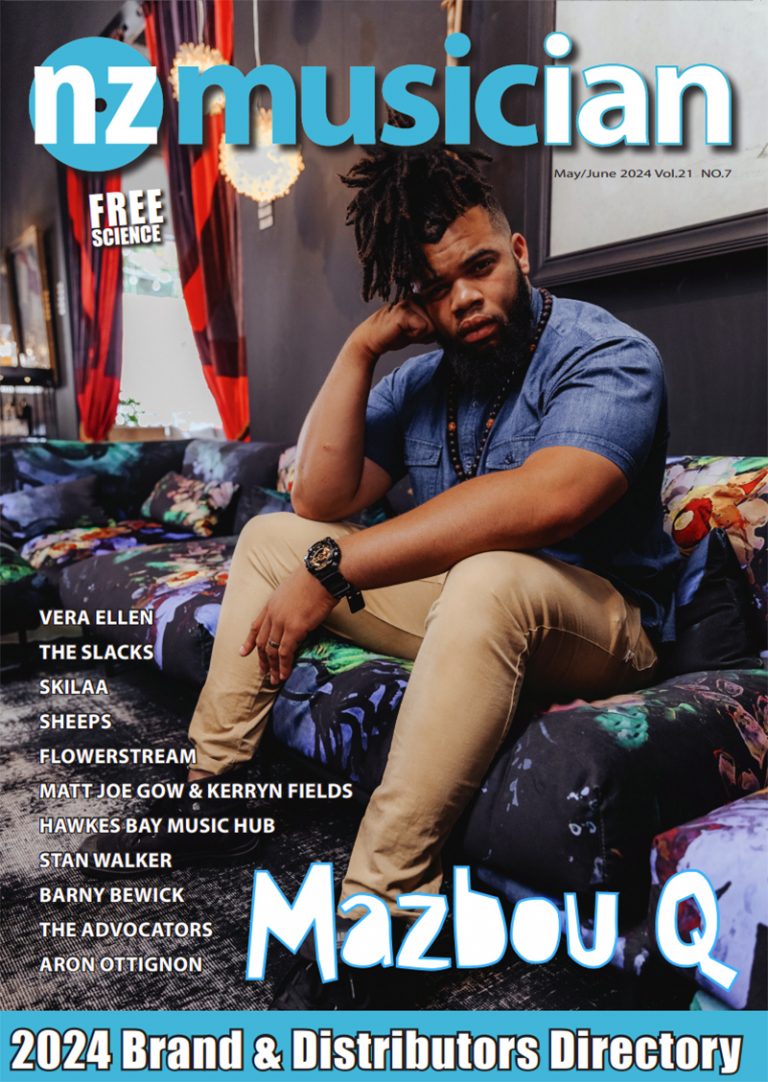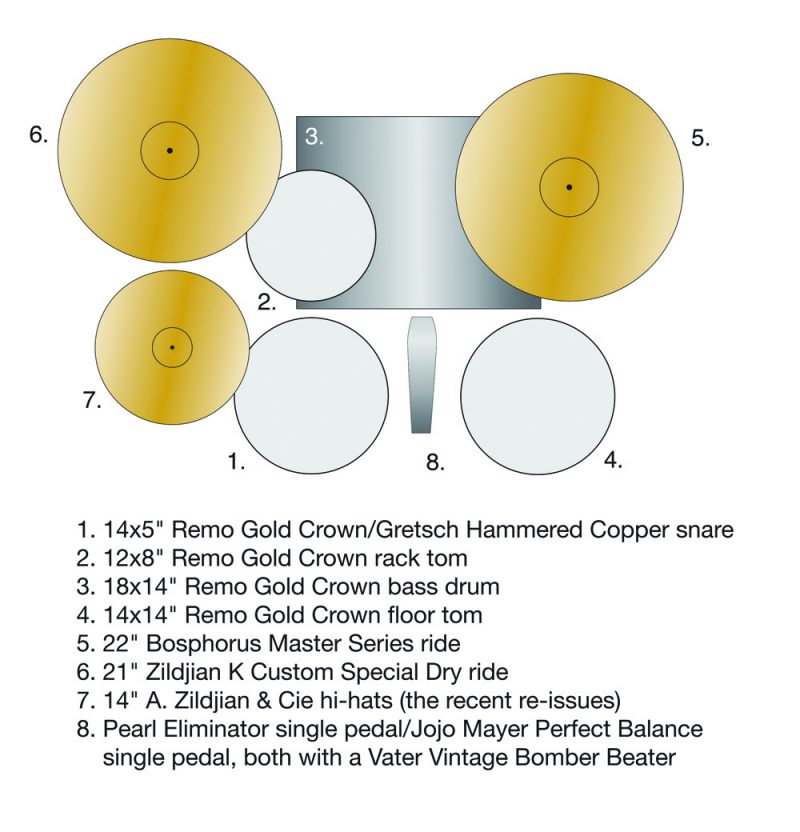Get Yer Kit Off: Hikurangi Schaverien-Kaa
Get Yer Kit Off: Hikurangi Schaverien-Kaa
With a playing history that encompasses the diversity of French For Rabbits, Glass Vaults and The Wellington City Shake-Em-On-Downers, Hikurangi Schaverien-Kaa has in recent years been establishing himself as one of the capital’s go-to drummers. That’s according to Myele Manzanza and he should know, right? Myele very kindly led this interview with Hikurangi for NZM.
How did you get started in music?
There was never an aha! moment, just an ongoing desire to be involved with music somehow, which I’ve felt throughout my life. I got my start on drums purely because my friend’s band was short a drummer. While I never thought I’d be a real musician, and initially pursued visual arts at university, the obsession with percussion hit me hard, and stayed with me.
Who are some of your main drum/musical influences? How do you feel their style has impacted on your own way of playing?
My teachers. I’ve been very lucky with whom Ive been able to study. In high school (Massey High in West Auckland) I studied with Swiss drummer Walter Mueller and jazz/funk/latin chameleon Tim Whitehead, who helped me get my hands into shape and hone my musical and melodic senses.
When I got to Wellington after high school I got to see a lot of incredible music. Highlights included seeing Rick Cranson in an early acoustic trio incarnation of the Little Bushman, Richard Wise playing in a trio with Nick Tipping and James Illingworth at Sandwiches every Wednesday, and yourself, playing with Olmecha Supreme, which makes this interview all the more surreal for me. I soon got lessons with Rick, whose fiery, rolling triplet I’ve always enjoyed and tried to approximate.
He introduced me to the masters. Elvin Jones (on Coltrane’s Crescent), Tony Williams (that solo on Seven Steps To Heaven!) and Max Roach (via A Study in Brown), and he set me on the path to playing jazz, by suggesting I try the Foundation Certificate in Jazz at the NZ School of Music in Wellington.
While I was at the NZ School of Music I studied with some phenomenal drummers – Lance Philip and the legendary Roger Sellers. Their wisdom has really stuck with me, and unlocking it is a lifelong process. I also managed to get lessons with some fantastic local and ex-local drummers like Reuben Bradley and Mark Lockett as well as internationals including Gregory Hutchinson, Mark Schilders, Steve Houghton, Joe LaBarbera, Jochen Rueckert, and Aussies Tim Firth and Jamie Cameron.
As for my contemporary favourites, I really enjoy almost anything that Marcus Gilmore, Nate Wood, Ari Hoenig, Jamire Williams, Justin Brown, Hutch and Jeff Ballard, touch. They blend the tradition and their own innovations, each with a distinctive, individual voice.
What gear are you using at the moment?
For rock/pop/fusion I play a Gretsch Renown Maple kit in Cherry Burst. 20×16″, 14×14″, 12×8″ and a 14×5″ snare. For jazz and acoustic music I have a Remo Gold Crown bop kit, in the same sizes but with a smaller, 18×14″ bass drum. I mostly play Zildjian cymbals, with a beautiful 22″ Bosphorus Traditional Master series ride cymbal I use for the more acoustic music I play, which I inherited from Richard Wise in 2010.
Who have been some of your favourite musicians / artists to work with over the years?
One of my early favourites is City Oh Sigh. The three original members (Kate Uhe, Sarah Smythe and Catherine Henehan), all came from a classical background, which gave the music a sort of chamber ensemble feeling. We played some wonderful, intimate shows and my experience with that band was a real master class in sensitivity and dynamics, which I feel have become some of my top priorities as a drummer.
In terms of pop music, this year I’ve been playing, touring and recording with French For Rabbits (Dunedin/Chch/Wellington) and Glass Vaults (Wellington/Auckland), both of whom I absolutely love playing with. Both bands give me the opportunity to purely consider my musical role rather than being concerned with logistics and other practical worries, so touring with them is blissful escapism. I currently play with a whole heap of groups in the jazz sphere – including the Wellington Mingus Ensemble, The Wellington City Shake-‘Em-On-Downers, and a lot of straight ahead jazz in various acoustic formats with a host of great local instrumentalists, mostly products of the NZSM. I also play in a couple of Brazilian and Salsa ensembles.
How do you approach developing your drumming technique. Do you feel like your musical ideas stem from your technique, or perhaps for you it’s the idea that comes first and the technique is in service of that?
I really agree that exceptional technique – a beautifully placed note, a silky snare roll, whatever – is an art with its own innate value. But to stop there, and value technical ability alone, can be a hollow goal. Technique should be invisible in the service of the song, and by that I mean a drummer should have the ability to play what’s required, without flexing their musical muscle any more than is necessary. It’s really nothing revolutionary, it’s about being a team player and supplying whatever is needed to bring out what other people have to offer, rather than swamping it.
Musical ideas can certainly be generated from technical investigations, and so many of my favourite hot licks are. But at present my biggest priority is to play, simply, cleanly, and competently to complement and serve the bigger musical landscape.
Do things outside of music feed into your approach or desire to playing the drums? Philosophical, cultural, spiritual, political, artistic or family influences perhaps?
If I have a philosophy, I guess it’s that being a drummer is important because of how the drums role connects the body to melody and harmony via rhythm. It feels central and special to me for that reason.
When a bass player and a drummer are locked together, the whole room is in the pocket, and the audience can intuitively feel this otherwise totally ephemeral thing, they can access the music on a corporeal level as well as a cerebral one. That elusive feeling is the number one priority for me, and the less thought and more intuition put towards the pursuit of this feeling, the better.
Music is a source of fulfillment, and it has shown me the world. French For Rabbits‘ 2014 European tour was a highlight, particularly Brittany and Italy. Touring has also given me opportunities to explore more of NZ than I ever thought I’d see. The morning cruise through Milford Sound to the edge of the Tasman Sea is pretty life-altering.
Do you think being from NZ gives you a distinct style or perspective on your approach? Do you identify with any particular school of drummers or artists?
The country is comparatively small, which means that musicians really benefit from being generalists. Wellington especially, supports a huge number of really wonderful and versatile players, considering its size.
As for how I identify as a drummer, my musical identity is something I find to be very fluid and difficult to define. Some of my favourite drummers from that young millennial crop (particularly from outside of Wellington) include Joe McCallum, Alex Freer, Stephen Thomas and Adam Tobeck. They all play with exceptional precision, but with a sort of soft-edged legato which I think exemplifies a NZ style at its best. Seeing any of those guys play is always a deeply humbling, learning experience!
- adam tobeck
- alex freer
- city oh sigh
- december/january 2016
- drumming
- drums
- Feature
- folk
- french for rabbits
- get yer kit off
- glass vaults
- hikurangi schaverien-kaa
- jazz
- joe mccallum
- lance philip
- myele manzanza
- pop
- rick cranson
- roger sellers
- stephen thomas
- the wellington city shake-em-on-downers
- tim whitehead
- walter mueller
- wellington


